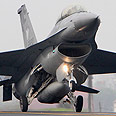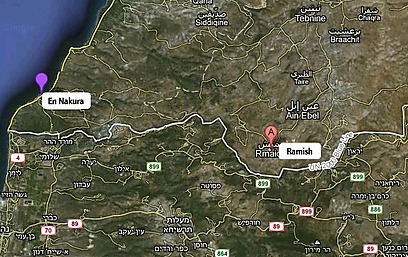
"Israeli forces have attacked a target on the Syrian-Lebanese border overnight," foreign and Arab media sources alleged Wednesday, saying that 12 IAF jets breached Lebanon's airspace on Tuesday.
The US-based Al-Monitor website quoted Lebanese sources as saying the target was a weapons convoy traveling near Syria’s border with Lebanon. The report has not been corroborated by any Israeli source and the IDF refused to comment on the matter.
Related Stories:
- Study: Iran, Hezbollah terror threat rising
- Report in Lebanon: Another spy for Israel arrested
- IDF MI chief meets Pentagon officials
Earlier, Beirut's news agency alleged that the Israeli fighter jets conducted three separate aerial incursions into Lebanon's airspace overnight.
According to the report, the jets flew over the En Nakura area for several hours, leaving Lebanese airspace at around 2 am. The report, citing military sources, said that the first incursion took place at around 4:30 pm, when two jets flew over the village of Ramish, leaving at 9:05 pm.
As the duo was leaving – according to the Lebanese report – two other IAF jets entered Lebanon's airspace, towards En Nakura, leaving at 2 am.

A Lebanese Army statement said that "Four Israeli planes entered Lebanese air space at 4:30 pm on Tuesday. They were replaced four hours later by another group of planes which overflew southern Lebanon until 2 am and a third mission took over, finally leaving at 7:55 am on Wednesday morning."
The statement made no mention of planes entering Syrian airspace.
A western diplomat and a security source said Wednesday that "Israeli forces have attacked a target on the Syrian-Lebanese border overnight."
Despite the ambiguity of Lebanon's reports, the diplomat – who declined to be named because of the sensitivity of the issue – insisted that "There was definitely a hit in the border area."
Lebanon's State-run news agency NNA, however, denied the reports.

The Israel-Syria border (Photo: AFP)
Syrian media ignored the reports and chose instead to highlight a report claiming that the Syrian army, with the help of Aleppo residents, seized Israel-made food supplies that had reached Syria via Turkey.
The US-based Al-Monitor website reported Tuesday that IDF Intelligence Chief Maj-Gen. Aviv Kochavi traveled to Washington for consultations with American officials. Israeli officials would not comment on the matter.
Among those Kochavi met with at the Pentagon was Chairman of the Joint Chiefs of Staff Gen. Martin Dempsey, the report said.
According to Al-Monitor, the IDF declined to comment on the MI chief's visit, saying that "Israel does not comment on the working visits of IDF officers."
However, the website qouted an anonymous Israeli official as saying that "Some people say (the) IDF wouldn’t object to (the) opportunity to set the record straight vis-à-vis Hezbollah... Also, there's the idea of putting them out of play, as done with Hamas recently."
Israel has been following the volatile situation in Syria and neighboring Lebanon closely, as concerns grow over the possibility that the Lebanon-based Hezbollah may get hold of Syrian President Bashar Assad's advanced weaponry.
Assad is believed to have the largest arsenal of nonconventional warfare in the world. Vice Premier Silvan Shalom said Sunday that any sign that Syria's grip on its chemical weapons is slipping could trigger Israeli military strikes.
Foreign media source quoted unnamed Israeli officials Tuesday as saying that "Syria's advanced conventional weapons would represent as much of a threat to Israel as its chemical arms, should they fall into the hands of Islamist rebels or Hezbollah guerrillas based in Lebanon."
Ynet's military analyst Ron Ben-Yishai says that tensions on the northern border are related to Israeli concerns that Hezbollah will take advantage of the chaos in Syria to obtain advanced weapons, including surface-to-air missiles and long range Scud-D missiles developed by Syria.
According to Ben-Yishai, Syria is cooperating with Hezbollah in order to prevent missiles and chemical weapons from falling into the hands of rebels.
If IAF jets had indeed flown over Lebanese territory on Tuesday, it was likely part of Israel's tight surveillance along the Syria-Lebanon border to prevent Hezbollah from obtaining weapons which could tip the balance of power. Such weapons could enable the terrorist group to target Israeli naval targets or locations across Israel.
Also on Tuesday, IAF Chief Maj.-Gen. Amir Eshel warned that Israel cannot remain complacent vis-à-vis the growing chaos is Syria and its possible effects on the balance of power in the region.
Earlier in the week, Israel deployed two Iron Dome batteries near the northern border.
The defense establishment's concerns about the potential threat of chemical weapons from Syria and Hezbollah has not gone unnoticed by the Israeli public.
The Israel Postal Service reported Wednesday that more Israelis are renewing their gas masks and ABC kits and that the number of Israelis changing their nonconventional warfare protection kits has nearly tripled over the past month.
Lebanon claims that Israel violates its airspace on a regular basis. In 2009, Beirut filed a complaint with the UN Security Council on the matter.
Reuters contributed to this report
- Receive Ynetnews updates
directly to your desktop















